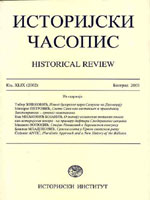Српски успон на Балкану према белешкама италијанских дипломатских представника и војника (1875–1903)
Serbian Rise in the Balkans according to Notes of Italian Diplomats and Military Personnel (1875–1903)
Author(s): Alberto BecherelliSubject(s): History, Diplomatic history, Modern Age
Published by: Istorijski institut, Beograd
Keywords: Eastern Question; Serbia; military rise; Italian diplomats and military personnel
Summary/Abstract: The paper focuses on the political and military history of Serbia from the Bosnian Uprising of 1875 to the assassination of Aleksandar Obrenović in 1903 according to Italian diplomats and military personnel. From the last decades of the 19th century, the Balkans became a region of particular political interest for Italy. The primary interest of the “young” Italian government was to maintain friendly relations with the Great Powers in order to fortify its position in the international arena and to participate with other European countries in the division of spheres of influence. At the same time, Italy was for the Balkan political élites a model and an example for their national unification. In this period, due to its contradictory role for the unification of the Yugoslav area, Serbia began to be considered the “Piedmont of the Balkans”, a definition that the Italian consuls in Belgrade used since the periodof Cavour. Italian diplomats and officers in the main capital cities of Europe followed the political life in Serbia and the military rising of the country: its intervention in support of the Bosnian Uprising of 1875–76 that saw a remarkable participation of Italian volunteers; the incessant reorganization of the Serbian military forces; the Serbian defeat in the Serbo-Bulgarian War of 1885; the Serbian political events on the eve of the assassination of the last monarch of the Obrenović Dynasty. Some Italian diplomats and officers were directly involved in the Serbian political and military events, such as Luigi Joannini Ceva di S. Michele, Consul in Belgrade in 1877; Major Attilio Velini in 1879 as a member of the international commission for the delimitation of the new borders of Serbia after the annexation of Niš, Vranje and Pirot established at the Congress of Berlin; or Lieutenant Colonel Alberto Cerruti, military attaché in Vienna and president of the international military commission for the armistice between Serbia and Bulgaria in December 1885. All of them were witnesses of the Serbian political and military rising in the Balkans and of its struggle against the supranational empires. Through their reports sent to the Italian government and General Staff in Rome, it is possible to analyze the political, military and territorial issues that troubled the Balkans at the end of the 19th century and to understand the interest of the Italian foreign policy towards the region.
Journal: Историјски часопис
- Issue Year: 2016
- Issue No: 65
- Page Range: 355-384
- Page Count: 30
- Language: Serbian

